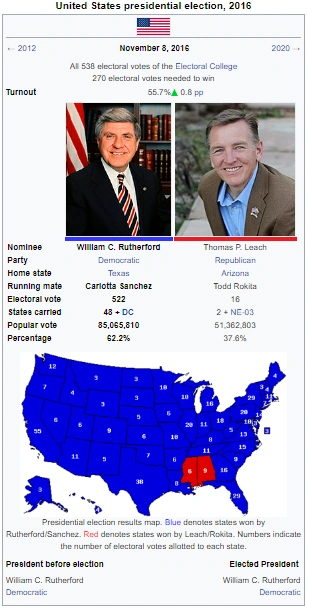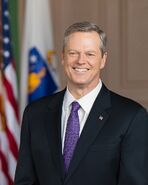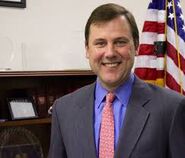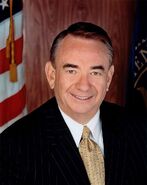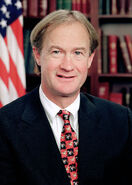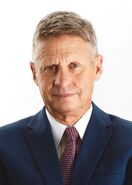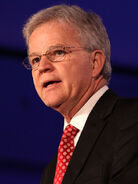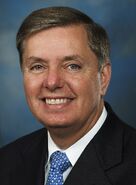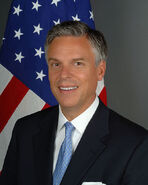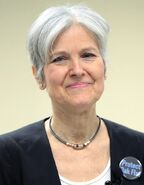The United States presidential election of 2016 was the 58th quadrennial presidential election. It was held on Tuesday, November 8, 2016. Incumbent Democratic President William C. Rutherford defeated Thomas P. Leach, the Republican nominee. With 62.2% of the popular vote, Rutherford won the highest share of the popular vote of any candidate since the uncontested 1820 election.
Rutherford had become President in January 2013, defeating his Republican opponent, President Mitt Romney, in the midst of the Great Recession and of military conflicts in Syria, Iraq, and Yemen. Rutherford, who had successfully revived economic growth and brought a close to these conflicts, was renominated without opposition in 2016. Rutherford ran alongside Vice President Carlotta Sanchez of California. Senator Thomas P. Leach of Arizona, one of the most conservative Republicans in the Senate, defeated moderate Governor Charlie Baker of Massachusetts at the 2016 Republican National Convention.
Rutherford championed his passage of the Criminal Justice Reform Act, and his campaign advocated a series of new economic programs known as the New Destiny. Leach called for the elimination of federal programs and spending, and he voted against the Criminal Justice Reform Act. Democrats successfully portrayed Leach as a dangerous extremist, most famously in the "Confessions" television advertisement. The Republican Party was badly divided between its moderate and conservative factions, with Baker and other moderate party leaders refusing to support Leach. Rutherford led by wide margins in all opinion polls throughout the entire campaign.
Rutherford carried 48 states and the District of Columbia, earning the second-highest number of electoral votes for a presidential candidate in modern times. Leach won two states in the Deep South-Alabama and Mississippi, which had, due to lingering backlash over the Civil Rights Movement and growing conservatism, become the most Republican states in that region. He lost several other Republican strongholds throughout the remainder of the country. Rutherford's landslide victory coincided with the defeat of many conservative Republican Congressmen, and the subsequent 115th Congress would pass major legislation such as the Border Security, Economic Opportunity, and Immigration Reform Act of 2017 and the Federal Education Reform Act of 2018. Leach's unsuccessful bid influenced the modern conservative movement and the long-time realignment within the Republican Party, culminating in the 2024 presidential victory of Brian Sandoval.
Nominations[]
Democratic Party[]
Primaries[]
With an incumbent President running for re-election against token opposition, the race for the Democratic nomination was largely uneventful. The nomination process consisted of primaries and caucuses, held by the 50 states, as well as Guam, Puerto Rico, Washington D.C., U.S. Virgin Islands, American Samoa, and Democrats Abroad. Additionally, high-ranking party members known as superdelegates each received one vote in the convention. President Rutherford won 97% of the total primary vote and cemented his status as the Democratic presumptive nominee on April 3, 2016, by securing the minimum number of pledged delegates to obtain the nomination.
Candidates[]
| Democratic Party ticket, 2016 | |||||||||||||||||||||||||||||
| William Rutherford | Carlotta Sanchez | ||||||||||||||||||||||||||||
|---|---|---|---|---|---|---|---|---|---|---|---|---|---|---|---|---|---|---|---|---|---|---|---|---|---|---|---|---|---|
| for President | for Vice President | ||||||||||||||||||||||||||||
| President of the United States (2013-2021) |
Vice President of the United States (2013-2021) | ||||||||||||||||||||||||||||
Republican Party[]
Primaries[]
In 2016, the Republican Party (GOP) was badly divided between its conservative and moderate-liberal factions. Former Vice President Tim Pawlenty, who had been on the losing ticket with former President Mitt Romney in the 2012 presidential election, decided not to run. Pawlenty, a moderate with ties to both wings of the GOP, decided that a run at this stage would not be a wise move. In his absence, the Party's two factions engaged in an all-out civil war for the nomination. Thomas P. Leach, a Senator from Arizona, was the standard-bearer of the conservatives. By 2016, the conservatives had established their main base in the South and West, and had shifted to strongly advocating a low-tax, small federal government which supported individual rights and business interests, while opposing social welfare programs. Many conservatives labeled members of the moderate wing as "RINOS", believing that they were little different from the Democrats in their philosophy and their approach to governance. Leach's primary opponent for the Republican nomination was Charlie Baker, Governor of Massachusetts and leader of the Party's moderate faction.
Initially, Baker was considered the front-runner, ahead of Leach. However, a scandal emerged in 2015 regarding Governor Baker's son, Andrew, who was accused of sexual assault and hazing. Baker's subsequent wavering over the affair, and the negative publicity which it brought, seriously damaged his chances at the nomination. Social conservatives and female voters within the GOP, outraged by the affair, shifted their support to Leach. Although Baker managed to win the New Hampshire primary, Leach built up his momentum through triumphs in the Iowa caucus and the South Carolina primary. The more minor candidates, including former Senator and Governor Lincoln Chaffee of Rhode Island, former Governor Gary Johnson of New Mexico, Senator Tommy Thompson of Wisconsin, Senator Thomas Kean, Jr. of New Jersey, Senator Lindsay Graham of South Carolina, former Governor Buddy Roemer of Louisiana, former Ambassador Jon Huntsman of Utah, and businesswoman Carly Fiorina of California, dropped out as they failed to increase their delegate counts. Leach won the Nevada caucuses by a significant margin. He subsequently swept most of the Super Tuesday primaries, with Baker obtaining victories only in Colorado, his home state of Massachusetts, Minnesota, Vermont, and Virginia. Leach continued his path through victories in Kentucky and Louisiana, and nearly upset Baker in Maine. Baker kept afloat with wins in Puerto Rico, Hawaii, Michigan, the U.S. Virgin Islands, and the District of Columbia. On March 15, he won the Illinois and Ohio primaries, but Leach scored a victory in Florida and defeated him handily in Missouri and North Carolina.
Baker lost out to Leach in Wisconsin, Pennsylvania, Indiana, Nebraska, and West Virginia, but won contests in Connecticut, Delaware, Maryland, Rhode Island, and New York. But his upset loss in the California primary on June 7, along with corresponding defeats in Montana, New Mexico, and South Dakota, when compounded with Leach's sweep of Arizona, Utah, Idaho, North Dakota, Oklahoma, Kansas, and all of the remaining states of the South, sealed his fate. He was finally eliminated as a potential nominee. GOP moderates and liberals begged former Vice President Pawlenty to put his name before the party Convention, but he refused. Thus, on July 18, 2016, Leach was formally nominated at the Republican National Convention in Salt Lake City, Utah. Leach subsequently selected little-known Representative Todd Rokita of Indiana, then Chairman of the Republican National Committee, as his running mate. When asked why he did so, the Senator responded that it was because he knew Rokita would "drive President Rutherford crazy."
Candidates[]
| Republican Party ticket, 2016 | |||||||||||||||||||||||||||||
| Thomas Leach | Todd Rokita | ||||||||||||||||||||||||||||
|---|---|---|---|---|---|---|---|---|---|---|---|---|---|---|---|---|---|---|---|---|---|---|---|---|---|---|---|---|---|
| for President | for Vice President | ||||||||||||||||||||||||||||
| U.S. Senator from Arizona (2011-2017) |
U.S. Representative from Indiana (2011-2017) | ||||||||||||||||||||||||||||
Withdrawn candidates[]
- Charlie Baker, Governor of Massachusetts (ended active campaigning on June 7, 2016; declined to endorse a candidate)
- Thomas Kean, Jr., Senator from New Jersey (withdrew on February 24, 2016; declined to endorse a candidate)
- Tommy Thompson, Senator from Wisconsin (withdrew on March 5, 2016; declined to endorse a candidate)
- Lincoln Chaffee, former Governor of Rhode Island (withdrew on March 15, 2016; endorsed William Weld)
- Gary Johnson, former Governor of New Mexico (withdrew on February 9, 2016; endorsed first Charlie Baker, then William Weld, after Baker ended active campaigning)
- Buddy Roemer, former Governor of Louisiana (withdrew on March 5, 2016; endorsed William Weld)
- Lindsay Graham, Senator from South Carolina (withdrew on February 23, 2016; declined to endorse a candidate)
- Jon Huntsman, former U.S. Ambassador from Utah (withdrew on February 9, 2016; endorsed first Charlie Baker, then President Rutherford)
- Carly Fiorina, former CEO of Hewlett-Packard (withdrew on February 23, 2016; declined to endorse a candidate)
Third parties and other nominations[]
Three other parties nominated candidates that had ballot access or write-in access to at least 270 electoral votes, the minimum number of votes needed in the 2016 election to win the Presidency through a majority of the Electoral College.
Libertarian Party[]
- William Weld, former Governor of Massachusetts. Vice-presidential nominee: Aubrey Dunn, Jr., Commissioner of Public Lands, from New Mexico.
Green Party[]
- Jill Stein, medical doctor from Massachusetts. Vice-presidential nominee: Ajamu Baraka, social activist, from Illinois.
Constitution Party[]
- Darrell Castle, attorney from Tennessee. Vice-presidential nominee: Scott Bradley, university administrator, from Utah.
Candidates gallery[]
General election[]
Campaign[]
Although Leach had been successful in rallying conservatives, he was unable to broaden his base of support for the general election. Shortly before the Republican Convention, he had alienated moderate Republicans by his vote against the bipartisan Criminal Justice Reform Act of 2016, which Rutherford championed and signed into law. Leach said that he was worried about the Act's effects on law enforcement agencies, and that he believed it to be unconstitutional. Leach's vote against the legislation helped cause African-Americans, Hispanics, and Asians to overwhelmingly support Rutherford. Leach had previously voted in favor of the 2014 and 2015 Drug Policy Reconciliation Acts, but only after proposing "restrictive amendments" to them. He was also infamous for speaking "off the cuff" at times, and many of his former statements were given wide publicity by the Democrats. In the early 2010s, Leach had called the Lugar administration a "Great Society in disguise", and the former President never fully forgave him or offered his full support in the election.
In December 2015, Leach told a news conference that he wished "we could cut out all the cities and replace them with something else", a remark which indicated his dislike of the liberal social and economic policies associated with those parts of the country. That comment came back to haunt him, in the form of a Rutherford television commercial, as did remarks about making Social Security voluntary, privatizing the Tennessee Valley Authority, and slashing Medicare, Medicaid, food stamps, and farm subsidies. In his most famous verbal gaffe, Leach joked that we should "lob a few bombs" in the direction of Iran and North Korea.
Leach was also hurt by the reluctance of many prominent moderate Republicans to support him. Governors Charlie Baker of Massachusetts and Larry Hogan of Maryland refused to endorse Leach and did not campaign for him. On the other hand, former Vice President Tim Pawlenty and Governor John Kasich of Ohio loyally supported the GOP ticket and campaigned for Leach, although Pawlenty did not entirely agree with Leach's political stances and said that it would be a "tragedy" if Leach's platform were not "challenged and repudiated" by the Republicans. Several prominent Republican newspapers, including The New Hampshire Union-Leader, The Houston Chronicle, The Dallas Morning News, The Columbus Dispatch, The San Diego Union-Dispatch, The Detroit News, The Chicago Tribune, and The Cincinnati Enquirer, supported Rutherford in the general election, the first time they had endorsed a Democrat in many decades. Some moderates even formed a "Republicans for Rutherford" organization, although most prominent GOP politicians avoided being associated with it.
Lugar's strong backing could have been an asset to the Leach campaign, but its absence was clearly noted. When questioned about the political capabilities of the former President's grandson Richard in July 2016, Leach replied, "One Lugar a generation is enough." However, Lugar did not openly repudiate Leach and made one television commercial for Leach's campaign.
Debates[]
The Commission on Presidential Debates held four debates during the last weeks of the campaign, three presidential and one vice-presidential. The major issues debated were the economy and jobs, the federal budget deficit, taxation and spending, the future of Social Security, Medicare, and Medicaid, healthcare reform, education, social issues, immigration, and foreign policy.
Debate schedule:
- Monday, September 26: The first presidential debate took place at Hofstra University in Hempstead, New York, moderated by Lester Holt.
- Tuesday, October 4: The vice-presidential debate took place at Longwood University in Farmville, Virginia, moderated by Elaine Quijano.
- Sunday, October 9: The second presidential debate took place at Washington University in St. Louis, Missouri, moderated by Anderson Cooper and Martha Raddatz.
- Wednesday, October 19: The third presidential debate took place at University of Nevada, Las Vegas, in Las Vegas, Nevada, moderated by Chris Wallace.
An independent presidential debate featuring minor party candidates took place on Tuesday, October 25, at Notre Dame University in South Bend, Indiana. The debate was moderated by Ed Asner and Christina Tobin, and was organized by the Free & Equal Elections Foundation. The participants were William Weld (Libertarian), Jill Stein (Green), and Darrell Castle (Constitution). A second debate between Stein and Weld took place on Tuesday, November 1, 2016, at the Palomar Hotel in Philadelphia, Pennsylvania. It was hosted by Democracy Now and moderated by Thom Hartman and Christina Tobin.
Ads and slogans[]
Rutherford positioned himself as a moderate and succeeded in portraying Leach as an extremist. Leach had a habit of making blunt statements about war, nuclear weapons, and economics that could be turned against him. Most famously, the Rutherford campaign broadcast a television commercial in September 2016, dubbed Nuclear Armageddon, which depicted the devastating effects of nuclear war, implied to result from a "rushed" military action on Leach's orders. Confessions of American Voters, another Rutherford ad, depicted various Americans expressing their disgust with Leach's views on healthcare, education, agriculture, and foreign policy, and their concerns about his "brashness" and "impulse of action." Voters increasingly viewed Leach as a right-wing fringe candidate. His slogan "You know he's straight" was successfully parodied by the Rutherford campaign into "You know he's mad", "You know he's far out", and "You know he's delusional."
The Rutherford campaign's greatest concern may have been voter complacency leading to low turnout in key states. To counter this, all of Rutherford's broadcast ads concluded with the line: "Vote for President Rutherford on November 3. America cannot afford the consequences if you do not." The Democratic campaign used two other slogans, "Move forward with WCR" and "Americans for WCR."
The election campaign was disrupted for a week by the death of former President John Glenn on October 20, 2016, because it was considered disrespectful to be campaigning during a time of mourning. Glenn died of natural causes. He had been U.S. President from 1981 to 1989. Both major candidates attended his funeral.
Rutherford led in all opinion polls by huge margins throughout the entire campaign.
Results[]
The election was held on November 8, 2016. Rutherford beat Leach in the general election, winning over 62% of the popular vote, the highest percentage since the popular vote first became widespread in 1824. In the end, Leach won only two states in the Deep South-Alabama and Mississippi-which had become Republican strongholds in recent decades. He also earned the electoral vote from Nebraska's 3rd congressional district. He became the first major-party presidential nominee since George McGovern in 1972 to lose his home state, Arizona, which he lost by a margin of just over 2%. Leach's 16 electoral votes were the fewest for any presidential candidate in history since 1936, when Alf Landon had earned just eight electoral votes against Franklin D. Roosevelt.

Election results by county.

2016 Presidential Election, Results by Congressional District.
The 2016 election marked a significant milestone for the Democratic Party in the electoral sense. With this victory, Rutherford became the first Democrat to win the states of Wyoming, Utah, and Idaho since Lyndon Johnson in 1964, and only the second Democrat, following John Glenn in 1984, to carry Oklahoma, Kansas, and Nebraska since Johnson. He was also only the third Democrat in history, following Johnson and Glenn, to win the state of Alaska.
Of the 3,142 counties, parishes, and independent cities making returns, Rutherford won in 2,561 (81.51%) while Leach carried 581 (18.49%).
The Rutherford landslide defeated many conservative Republican congressmen, giving him a more progressive majority with which to enact his legislative agenda.
This is the last election prior to the admission of Puerto Rico to the Union.
The Rutherford campaign broke two prior electoral records previously held by Lyndon B. Johnson and Richard Nixon: the largest share of the popular vote under the current Democratic/Republican competition (Johnson won 61.1% nationwide, Rutherford 62.2%), and the largest number of congressional districts carried by a single presidential candidate (Rutherford won 397 districts, Nixon 378). Rutherford retains the record for the highest percentage of the popular vote as of the 2040 election.
| Presidential candidate | Party | Home state | Popular vote | Electoral vote |
Running mate | |||
|---|---|---|---|---|---|---|---|---|
| Count | Percentage | Vice-presidential candidate | Home state | Electoral vote | ||||
| William Casey Rutherford (Incumbent) | Democratic | Texas | 85,065,810 | 62.24% | 522 | Carlotta Sanchez | California | 522 |
| Thomas Pirchard Leach | Republican | Arizona | 51,362,803 | 37.58% | 16 | Todd Rokita | Indiana | 16 |
| William Weld | Libertarian | Massachusetts | 136,669 | 0.10% | 0 | Aubrey Dunn, Jr. | New Mexico | 0 |
| Jill Stein | Green | Massachusetts | 73,776 | 0.05% | 0 | Ajamu Baraka | Illinois | 0 |
| Darrell Castle | Constitution | Tennessee | 27,334 | 0.02% | 0 | Scott Bradley | Utah | 0 |
| Other | 13,667 | 0.01% | — | Other | — | |||
| Total | 136,669,276 | 100% | 538 | 538 | ||||
| Needed to win | 270 | 270 | ||||||
Geography of results[]
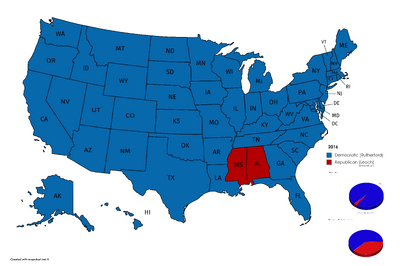
Cartographic gallery[]
Results by state[]
| States/districts won by Rutherford/Sanchez |
| States/districts won by Leach/Rokita |
| William Casey Rutherford Democratic |
Thomas Pirchard Leach Republican |
Margin | State Total | ||||||||
|---|---|---|---|---|---|---|---|---|---|---|---|
| State | electoral votes |
# | % | electoral votes |
# | % | electoral votes |
# | % | # | |
| Alabama | 9 | 1,009,663 | 47.55 | - | 1,113,708 | 52.45 | 9 | -104,045 | -4.90 | 2,123,372 | AL |
| Alaska | 3 | 209,995 | 65.91 | 3 | 108,613 | 34.09 | - | 101,382 | 31.82 | 318,608 | AK |
| Arizona | 11 | 1,316,174 | 51.15 | 11 | 1,256,991 | 48.85 | - | 59,183 | 2.30 | 2,573,165 | AZ |
| Arkansas | 6 | 633,833 | 56.06 | 6 | 490,808 | 43.41 | - | 143,025 | 12.66 | 1,130,635 | AR |
| California | 55 | 9,494,578 | 66.95 | 55 | 4,687,017 | 33.05 | - | 4,821,742 | 33.90 | 14,181,595 | CA |
| Colorado | 9 | 1,826,066 | 65.68 | 9 | 954,181 | 34.32 | - | 871,885 | 31.36 | 2,780,247 | CO |
| Connecticut | 7 | 1,115,420 | 67.81 | 7 | 527,855 | 32.09 | - | 587,565 | 35.72 | 1,644,920 | CT |
| Delaware | 3 | 308,451 | 69.50 | 3 | 135,263 | 30.50 | - | 173,188 | 39.00 | 443,814 | DE |
| D.C. | 3 | 287,798 | 92.46 | 3 | 20,326 | 6.53 | - | 267,472 | 85.93 | 311,268 | DC |
| Florida | 29 | 5,323,264 | 56.51 | 29 | 4,095,833 | 43.48 | - | 1,227,431 | 13.03 | 9,420,039 | FL |
| Georgia | 16 | 2,394,774 | 58.20 | 16 | 1,719,958 | 41.80 | - | 674,816 | 16.40 | 4,114,732 | GA |
| Hawaii | 4 | 337,831 | 78.76 | 4 | 91,106 | 21.24 | - | 246,725 | 57.52 | 428,937 | HI |
| Idaho | 4 | 351,478 | 50.92 | 4 | 338,777 | 49.08 | - | 12,701 | 1.83 | 690,255 | ID |
| Illinois | 20 | 3,602,551 | 65.07 | 20 | 1,933,873 | 34.93 | - | 1,668,678 | 30.14 | 5,536,424 | IL |
| Indiana | 11 | 1,531,029 | 55.98 | 11 | 1,191,348 | 43.56 | - | 339,681 | 12.42 | 2,734,958 | IN |
| Iowa | 6 | 981,275 | 62.66 | 6 | 583,503 | 37.26 | - | 397,772 | 25.40 | 1,566,031 | IA |
| Kansas | 6 | 640,643 | 54.09 | 6 | 533,692 | 45.06 | - | 106,951 | 9.03 | 1,184,402 | KS |
| Kentucky | 8 | 1,231,648 | 64.01 | 8 | 685,959 | 35.65 | - | 545,689 | 28.36 | 1,924,149 | KY |
| Louisiana | 8 | 1,138,490 | 56.11 | 8 | 890,542 | 43.89 | - | 247,948 | 12.22 | 2,029,032 | LA |
| Maine | 4 | 514,574 | 68.80 | 4 | 232,904 | 31.14 | - | 281,670 | 37.66 | 747,927 | ME |
| Maryland | 10 | 1,821,013 | 65.47 | 10 | 960,433 | 34.53 | - | 860,580 | 30.94 | 2,781,446 | MD |
| Massachusetts | 11 | 2,533,353 | 76.19 | 11 | 779,391 | 23.44 | - | 1,753,962 | 52.75 | 3,325,046 | MA |
| Michigan | 16 | 3,201,122 | 66.70 | 16 | 1,588,563 | 33.10 | - | 1,612,537 | 33.60 | 4,799,284 | MI |
| Minnesota | 10 | 1,920,902 | 65.23 | 10 | 975,322 | 33.12 | - | 975,188 | 32.11 | 2,944,813 | MN |
| Mississippi | 6 | 490,515 | 40.56 | - | 718,842 | 59.44 | 6 | -228,327 | -18.88 | 1,209,357 | MS |
| Missouri | 10 | 1,798,912 | 64.05 | 10 | 1,001,268 | 35.95 | - | 797,644 | 28.10 | 2,808,605 | MO |
| Montana | 3 | 293,068 | 58.95 | 3 | 201,693 | 40.57 | - | 91,375 | 18.38 | 497,147 | MT |
| Nebraska | 5 | 441,148 | 52.61 | 4 | 400,079 | 47.39 | 1 | 41,069 | 5.22 | 844,227 | NE |
| Nevada | 6 | 659,251 | 58.58 | 6 | 466,134 | 41.42 | - | 193,117 | 17.16 | 1,125,385 | NV |
| New Hampshire | 4 | 491,831 | 66.08 | 4 | 250,009 | 33.59 | - | 241,822 | 32.49 | 744,296 | NH |
| New Jersey | 14 | 2,541,762 | 65.61 | 14 | 1,311,752 | 33.86 | - | 1,230,010 | 31.75 | 3,874,046 | NJ |
| New Mexico | 5 | 549,403 | 68.82 | 5 | 248,916 | 31.18 | - | 300,487 | 37.64 | 798,319 | NM |
| New York | 29 | 5,293,828 | 68.56 | 29 | 2,417,587 | 31.31 | - | 2,876,241 | 37.25 | 7,721,453 | NY |
| North Carolina | 15 | 2,662,388 | 56.15 | 15 | 2,079,176 | 43.85 | - | 583,212 | 12.30 | 4,741,564 | NC |
| North Dakota | 3 | 199,625 | 57.97 | 3 | 142,217 | 41.88 | - | 57,408 | 16.09 | 344,360 | ND |
| Ohio | 18 | 3,459,489 | 62.94 | 18 | 2,036,998 | 37.06 | - | 1,422,491 | 25.88 | 5,496,487 | OH |
| Oklahoma | 7 | 810,043 | 55.75 | 7 | 642,949 | 44.25 | - | 167,094 | 11.50 | 1,452,992 | OK |
| Oregon | 7 | 1,275,351 | 63.72 | 7 | 719,680 | 35.96 | - | 555,671 | 27.76 | 2,001,336 | OR |
| Pennsylvania | 20 | 4,002,628 | 64.92 | 20 | 2,139,421 | 34.70 | - | 1,863,207 | 30.22 | 6,165,478 | PA |
| Rhode Island | 4 | 375,353 | 80.87 | 4 | 88,790 | 19.13 | - | 286,563 | 61.74 | 464,144 | RI |
| South Carolina | 9 | 1,181,270 | 56.17 | 9 | 907,036 | 43.13 | - | 274,234 | 13.04 | 2,103,027 | SC |
| South Dakota | 3 | 205,809 | 55.61 | 3 | 164,284 | 44.39 | - | 41,525 | 11.22 | 370,093 | SD |
| Tennessee | 11 | 1,391,955 | 55.50 | 11 | 1,115,821 | 44.49 | - | 276,134 | 11.01 | 2,508,027 | TN |
| Texas | 38 | 5,679,314 | 63.32 | 38 | 3,272,871 | 36.49 | - | 2,406,443 | 26.83 | 8,969,226 | TX |
| Utah | 6 | 620,702 | 54.86 | 6 | 510,728 | 45.14 | - | 109,974 | 9.73 | 1,131,430 | UT |
| Vermont | 3 | 227,541 | 72.22 | 3 | 87,526 | 27.78 | - | 140,015 | 44.44 | 315,067 | VT |
| Virginia | 13 | 2,133,371 | 53.54 | 13 | 1,840,103 | 46.18 | - | 293,268 | 7.36 | 3,984,631 | VA |
| Washington | 12 | 2,077,449 | 62.63 | 12 | 1,239,570 | 37.37 | - | 837,879 | 25.26 | 3,317,019 | WA |
| West Virginia | 5 | 485,379 | 67.94 | 5 | 229,044 | 32.06 | - | 256,335 | 35.88 | 714,423 | WV |
| Wisconsin | 10 | 1,847,892 | 62.09 | 10 | 1,123,199 | 37.74 | - | 724,693 | 24.35 | 2,976,150 | WI |
| Wyoming | 3 | 144,708 | 56.56 | 3 | 111,141 | 43.44 | - | 33,567 | 13.12 | 255,849 | WY |
| TOTALS: | 538 | 85,065,810 | 62.24 | 522 | 51,362,803 | 37.58 | 16 | 33,703,007 | 24.66 | 136,669,276 | US |
Close states[]
Margin of victory less than 5% (24 electoral votes):
- Idaho, 1.83%
- Arizona, 2.30%
- Alabama, 4.90%
Margin of victory over 5%, but less than 10% (30 electoral votes):
- Nebraska, 5.22%
- Virginia, 7.36%
- Kansas, 9.03%
- Utah, 9.73%
State margins and county information[]
States with the Smallest Margin of Victory:
| State | EV | Total Vote | % Margin | Margin | Rutherford | Leach |
|---|---|---|---|---|---|---|
| Idaho | 4 | 690,255 | 1.83% | 12,701 | 50.92% | 49.08% |
| Arizona | 11 | 2,573,165 | 2.30% | 59,183 | 51.15% | 48.85% |
| Alabama | 9 | 2,173,372 | 4.90% | 104,045 | 47.55% | 52.45% |
| Nebraska | 5 | 844,227 | 5.22% | 41,069 | 52.61% | 47.39% |
| Virginia | 13 | 3,984,631 | 7.36% | 293,268 | 53.54% | 46.18% |
| Kansas | 6 | 1,184,402 | 9.03% | 106,951 | 54.09% | 45.06% |
| Utah | 6 | 1,131,430 | 9.73% | 109,974 | 54.86% | 45.14% |
| Tennessee | 11 | 1,391,955 | 11.01% | 276,134 | 55.50% | 44.49% |
| South Dakota | 3 | 370,093 | 11.22% | 41,525 | 55.61% | 44.39% |
| Oklahoma | 7 | 1,452,992 | 11.50% | 167,094 | 55.75% | 44.25% |
| Louisiana | 8 | 2,029,032 | 12.22% | 247,948 | 56.11% | 43.89% |
States with the Largest Margin of Victory:
| State | EV | Total Vote | % Margin | Margin | Rutherford | Leach |
|---|---|---|---|---|---|---|
| District of Columbia | 3 | 311,268 | 85.93% | 267,472 | 92.46% | 6.53% |
| Rhode Island | 4 | 464,144 | 61.74% | 286,563 | 80.87% | 19.13% |
| Hawaii | 4 | 428,937 | 57.52% | 246,725 | 78.76% | 21.24% |
| Massachusetts | 11 | 3,325,046 | 52.75% | 1,753,962 | 76.19% | 23.44% |
| Vermont | 3 | 315,067 | 44.44% | 140,015 | 72.22% | 27.78% |
| Delaware | 3 | 443,814 | 39.00% | 173,188 | 69.50% | 30.50% |
| Maine | 4 | 747,927 | 37.66% | 281,670 | 68.80% | 31.14% |
| New Mexico | 5 | 798,319 | 37.64% | 300,487 | 68.82% | 31.18% |
| New York | 29 | 7,721,453 | 37.25% | 2,876,241 | 68.56% | 31.31% |
| West Virginia | 5 | 714,423 | 35.88% | 256,335 | 67.94% | 32.06% |
States with Highest Percent of Vote:
| Rutherford | Percentage | Leach | Percentage |
|---|---|---|---|
| District of Columbia | 92.46% | Mississippi | 59.44% |
| Rhode Island | 80.87% | Alabama | 52.45% |
| Hawaii | 78.76% | Idaho | 49.08% |
| Massachusetts | 76.19% | Arizona | 48.85% |
| Vermont | 72.22% | Nebraska | 47.39% |
States with Lowest Percent of Vote:
| Rutherford | Percentage | Leach | Percentage |
|---|---|---|---|
| Mississippi | 40.56% | District of Columbia | 6.53% |
| Alabama | 47.55% | Rhode Island | 19.13% |
| Idaho | 50.92% | Hawaii | 21.24% |
| Arizona | 51.15% | Massachusetts | 23.44% |
| Nebraska | 52.61% | Vermont | 27.78% |
States with Largest Vote Swing:
| Rutherford | Swing | Leach | Swing |
|---|---|---|---|
| California | 1,881,370 | New York | -545,878 |
| New York | 1,338,293 | Massachusetts | -473,461 |
| Texas | 1,185,171 | New Jersey | -395,545 |
| Florida | 1,122,613 | Michigan | -344,035 |
| Pennsylvania | 825,451 | Missouri | -325,832 |
States with Largest Vote Swing Percentage:
| State | Percentage |
|---|---|
| Alaska | 45.81% |
| Utah | 38.52% |
| Rhode Island | 32.30% |
| Massachusetts | 32.08% |
| Vermont | 29.91% |
States with Largest Change in Total Votes:
| State | Increasing | State | Decreasing |
|---|---|---|---|
| California | 1,143,048 | Wisconsin | -92,284 |
| Texas | 975,375 | Ohio | -84,360 |
| Florida | 945,860 | Mississippi | -76,227 |
| New York | 640,294 | Iowa | -16,249 |
| Pennsylvania | 411,808 | Hawaii | -5,760 |
State Ranks:
| Rank | Rutherford | Leach |
|---|---|---|
| 1 | 49 | 2 |
| 2 | 2 | 49 |
County Ranks:
| Rank | Rutherford | Leach |
|---|---|---|
| 1 | 2,561 | 581 |
| 2 | 581 | 2,561 |
Congressional District Ranks:
| Rank | Rutherford | Leach |
|---|---|---|
| 1 | 397 | 38 |
| 2 | 38 | 397 |
Counties with Highest Percent of Vote:
| Rutherford | Percentage | Leach | Percentage |
|---|---|---|---|
| District of Columbia, DC | 92.46% | Lamar, MS | 80.20% |
| Duval, TX | 92.46% | Rankin, MS | 79.89% |
| Knott, KY | 90.61% | Smith, MS | 78.29% |
| Webb, TX | 90.05% | George, MS | 77.80% |
| Aleutians West, AK | 90.02% | Pearl River, MS | 76.40% |
Counties with Lowest Percent of Vote:
| Rutherford | Percentage | Leach | Percentage |
|---|---|---|---|
| Lamar, MS | 19.80% | District of Columbia, DC | 6.53% |
| Rankin, MS | 20.11% | Duval, TX | 7.47% |
| Smith, MS | 21.71% | Knott, KY | 9.19% |
| George, MS | 22.20% | Webb, TX | 9.82% |
| Pearl River, MS | 23.60% | Aleutians West, AK | 9.98% |
Counties with Highest Number of Votes:
| Rutherford | Percentage | Leach | Percentage |
|---|---|---|---|
| Los Angeles, CA | 2,463,699 | Los Angeles, CA | 970,609 |
| Cook, IL | 1,550,641 | Maricopa, AZ | 859,869 |
| San Diego, CA | 847,504 | Cook, IL | 642,985 |
| Harris, TX | 739,789 | Harris, TX | 570,574 |
| Maricopa, AZ | 726,880 | Orange, CA | 539,381 |
| Miami-Dade, FL | 676,178 | San Diego, CA | 458,896 |
| Orange, CA | 658,140 | King, WA | 398,859 |
| Wayne, MI | 646,040 | Riverside, CA | 372,572 |
| Brooklyn, NY | 640,456 | Dallas, TX | 338,820 |
| King, WA | 629,591 | Miami-Dade, FL | 304,028 |
Counties with Lowest Number of Votes:
| Rutherford | Percentage | Leach | Percentage |
|---|---|---|---|
| Kalawao, HI | 15 | Kalawao, HI | 5 |
| Loving, TX | 38 | King, TX | 25 |
| McPherson, NE | 92 | Loving, TX | 26 |
| Arthur, NE | 93 | Kenedy, TX | 39 |
| Blaine, NE | 118 | Yakutat, AK | 67 |
| Loup, NE | 128 | Petroleum, MT | 153 |
| King, TX | 134 | Arthur, NE | 179 |
| Kenedy, TX | 147 | McPherson, NE | 194 |
| Petroleum, MT | 169 | Blaine, NE | 198 |
| Yakutat, AK | 279 | Loup, NE | 254 |
Counties with Lowest Percent of Vote and Win:
| Rutherford | Percentage | Leach | Percentage |
|---|---|---|---|
| Charleston, SC | 49.58% | Halifax, VA | 49.54% |
| Newton, AR | 49.58% | Graham, KS | 49.64% |
| Stevens, KS | 49.80% | Logan, KS | 49.82% |
| Whitley, KY | 49.80% | Johnson, KY | 49.89% |
| La Grange, IN | 49.95% | Wayne, IN | 49.93% |
Counties with Highest Percent of Vote and Lose:
| Rutherford | Percentage | Leach | Percentage |
|---|---|---|---|
| Henrico, VA | 49.99% | Buffalo, NE | 49.95% |
| Brantley, GA | 49.98% | Doddridge, WV | 49.91% |
| Washington, VA | 49.92% | Boone, NE | 49.84% |
| Harding, SD | 49.90% | Green Lake, WI | 49.83% |
| Hancock, OH | 49.90% | Dickey, ND | 49.81% |
Results by demographic group[]
Voter demographics (2016)[]
| 2016 Presidential vote by demographic subgroup (two-party electorate) | ||||
|---|---|---|---|---|
| Demographic subgroup | Rutherford | Leach | % of total vote | |
| Total vote | 62 | 38 | 100 | |
| Ideology | ||||
| Liberals | 96 | 4 | 26 | |
| Moderates | 71 | 29 | 39 | |
| Conservatives | 29 | 71 | 35 | |
| Party | ||||
| Democrats | 95 | 5 | 37 | |
| Republicans | 21 | 79 | 32 | |
| Independents | 66 | 34 | 31 | |
| Party by gender | ||||
| Democratic men | 93 | 7 | 14 | |
| Democratic women | 96 | 4 | 23 | |
| Republican men | 20 | 80 | 17 | |
| Republican women | 22 | 78 | 16 | |
| Independent men | 61 | 39 | 17 | |
| Independent women | 71 | 29 | 14 | |
| Gender | ||||
| Men | 61 | 39 | 47 | |
| Women | 64 | 36 | 53 | |
| Gender by marital status | ||||
| Married men | 58 | 42 | 29 | |
| Married women | 62 | 38 | 30 | |
| Non-married men | 62 | 38 | 18 | |
| Non-married women | 66 | 34 | 23 | |
| Race/ethnicity | ||||
| White | 55 | 45 | 74 | |
| Black | 94 | 6 | 12 | |
| Asian | 73 | 27 | 3 | |
| Other | 60 | 40 | 2 | |
| Hispanic | 71 | 29 | 9 | |
| Gender by race/ethnicity | ||||
| White men | 53 | 47 | 34 | |
| White women | 57 | 43 | 37 | |
| Black men | 93 | 7 | 5 | |
| Black women | 95 | 5 | 7 | |
| Latino men (of any race) | 70 | 30 | 4 | |
| Latino women (of any race) | 75 | 25 | 5 | |
| All other races | 67 | 33 | 5 | |
| Religion | ||||
| Protestant | 55 | 45 | 27 | |
| Catholic | 76 | 24 | 23 | |
| Mormon | 52 | 48 | 1 | |
| Other Christian | 56 | 44 | 24 | |
| Jewish | 84 | 16 | 3 | |
| Other | 58 | 42 | 7 | |
| None | 63 | 37 | 15 | |
| Religious service attendance | ||||
| Weekly or more | 58 | 42 | 33 | |
| Monthly | 61 | 39 | 16 | |
| A few times a year | 66 | 34 | 29 | |
| Never | 62 | 38 | 22 | |
| White evangelical or born-again Christian? | ||||
| White evangelical or born-again Christian | 52 | 48 | 26 | |
| Everyone else | 66 | 34 | 74 | |
| Age | ||||
| 18–24 years old | 71 | 29 | 10 | |
| 25–29 years old | 65 | 35 | 9 | |
| 30–39 years old | 63 | 37 | 17 | |
| 40–49 years old | 62 | 38 | 19 | |
| 50–64 years old | 60 | 40 | 30 | |
| 65 and older | 59 | 41 | 15 | |
| Age by race | ||||
| Whites 18–29 years old | 64 | 36 | 12 | |
| Whites 30–44 years old | 56 | 44 | 17 | |
| Whites 45–64 years old | 53 | 47 | 31 | |
| Whites 65 and older | 51 | 49 | 14 | |
| Blacks 18–29 years old | 92 | 8 | 2 | |
| Blacks 30–44 years old | 95 | 5 | 4 | |
| Blacks 45–64 years old | 94 | 6 | 5 | |
| Blacks 65 and older | 94 | 6 | 1 | |
| Latinos 18–29 years old | 79 | 21 | 1 | |
| Latinos 30–44 years old | 76 | 24 | 3 | |
| Latinos 45–64 years old | 70 | 30 | 4 | |
| Latinos 65 and older | 70 | 30 | 1 | |
| Others | 67 | 33 | 5 | |
| Sexual orientation | ||||
| LGBT | 92 | 8 | 5 | |
| Heterosexual | 61 | 39 | 95 | |
| First time voter | ||||
| First time voter | 70 | 30 | 10 | |
| Everyone else | 62 | 38 | 90 | |
| Education | ||||
| High school or less | 66 | 34 | 18 | |
| Some college education | 63 | 37 | 32 | |
| College graduate | 56 | 44 | 32 | |
| Postgraduate education | 71 | 29 | 18 | |
| Education by race/ethnicity | ||||
| White college graduates | 52 | 48 | 39 | |
| White no college degree | 58 | 42 | 35 | |
| Non-white college graduates | 79 | 21 | 12 | |
| Non-white no college degree | 84 | 16 | 14 | |
| Education by race/ethnicity/sex | ||||
| White women with college degrees | 52 | 48 | 21 | |
| White men with college degrees | 52 | 48 | 18 | |
| White women without college degrees | 59 | 41 | 18 | |
| White men without college degrees | 57 | 43 | 17 | |
| Non-whites | 82 | 18 | 26 | |
| Family income | ||||
| Under $30,000 | 71 | 29 | 17 | |
| $30,000–49,999 | 69 | 31 | 19 | |
| $50,000–99,999 | 59 | 41 | 31 | |
| $100,000–199,999 | 56 | 44 | 24 | |
| $200,000–249,999 | 58 | 42 | 4 | |
| Over $250,000 | 58 | 42 | 6 | |
| Region | ||||
| Northeast | 70 | 30 | 19 | |
| Midwest | 65 | 35 | 24 | |
| South | 59 | 41 | 37 | |
| West | 64 | 36 | 21 | |
| Union households | ||||
| Union | 73 | 27 | 18 | |
| Non-union | 60 | 40 | 82 | |
| Military service | ||||
| Veterans | 56 | 44 | 13 | |
| Non-veterans | 64 | 36 | 87 | |
| Community size | ||||
| Cities (population 50,000 and above) | 70 | 30 | 34 | |
| Suburbs | 59 | 41 | 49 | |
| Rural areas | 64 | 36 | 17 | |
Electoral records[]
- This was the last election before the admission of Puerto Rico into the Union. It would also be the last time that there would be 538 electoral votes.
- This was the first time since 1964 that the states of Idaho, Utah, and Wyoming voted Democratic, and the first time since 1984 that the states of Kansas, Nebraska, and Oklahoma did so.
- This was the first time since 1844 that Boone County, Illinois voted Democratic, the first time since 1852 that DuPage, McHenry, and Lee Counties, Illinois voted Democratic, and the first time ever that Carroll, Edwards, and Ogle Counties, Illinois did so. It was also the first time since 1912 that Carroll County, New Hampshire voted Democratic.
- Rutherford won every county in twelve states: Alaska, Connecticut, Delaware, Hawaii, Illinois, Maine, Massachusetts, New Hampshire, New Jersey, New York, Rhode Island, and Vermont.
- 2016 was the first election since 1924 in which every county in New England voted for a single presidential candidate.
